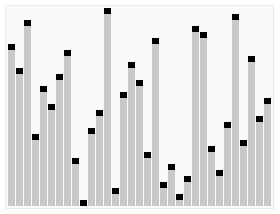Heap Sort
k
a
L
n
A
E
J
A
"""
This is a pure Python implementation of the heap sort algorithm.
For doctests run following command:
python -m doctest -v heap_sort.py
or
python3 -m doctest -v heap_sort.py
For manual testing run:
python heap_sort.py
"""
def heapify(unsorted, index, heap_size):
largest = index
left_index = 2 * index + 1
right_index = 2 * index + 2
if left_index < heap_size and unsorted[left_index] > unsorted[largest]:
largest = left_index
if right_index < heap_size and unsorted[right_index] > unsorted[largest]:
largest = right_index
if largest != index:
unsorted[largest], unsorted[index] = unsorted[index], unsorted[largest]
heapify(unsorted, largest, heap_size)
def heap_sort(unsorted):
"""
Pure implementation of the heap sort algorithm in Python
:param collection: some mutable ordered collection with heterogeneous
comparable items inside
:return: the same collection ordered by ascending
Examples:
>>> heap_sort([0, 5, 3, 2, 2])
[0, 2, 2, 3, 5]
>>> heap_sort([])
[]
>>> heap_sort([-2, -5, -45])
[-45, -5, -2]
"""
n = len(unsorted)
for i in range(n // 2 - 1, -1, -1):
heapify(unsorted, i, n)
for i in range(n - 1, 0, -1):
unsorted[0], unsorted[i] = unsorted[i], unsorted[0]
heapify(unsorted, 0, i)
return unsorted
if __name__ == "__main__":
user_input = input("Enter numbers separated by a comma:\n").strip()
unsorted = [int(item) for item in user_input.split(",")]
print(heap_sort(unsorted))
About this Algorithm
Problem Statement
Given an unsorted array of n elements, write a function to sort the array
Approach
- Build a max heap from the input data.
- At this point, the largest item is stored at the root of the heap. Replace it with the last item of the heap followed by reducing the size of heap by 1. Finally, heapify the root of tree.
- Repeat above steps while size of heap is greater than 1.
Time Complexity
O(n log n) Worst case performance
O(n log n) (distinct keys)
or O(n) (equal keys) Best-case performance
O(n log n) Average performance
Space Complexity
O(1) Worst case auxiliary
Example
Input data: 4, 10, 3, 5, 1
4(0)
/ \
10(1) 3(2)
/ \
5(3) 1(4)
The numbers in bracket represent the indices in the array
representation of data.
Applying heapify procedure to index 1:
4(0)
/ \
10(1) 3(2)
/ \
5(3) 1(4)
Applying heapify procedure to index 0:
10(0)
/ \
5(1) 3(2)
/ \
4(3) 1(4)
The heapify procedure calls itself recursively to build heap
in top down manner.
